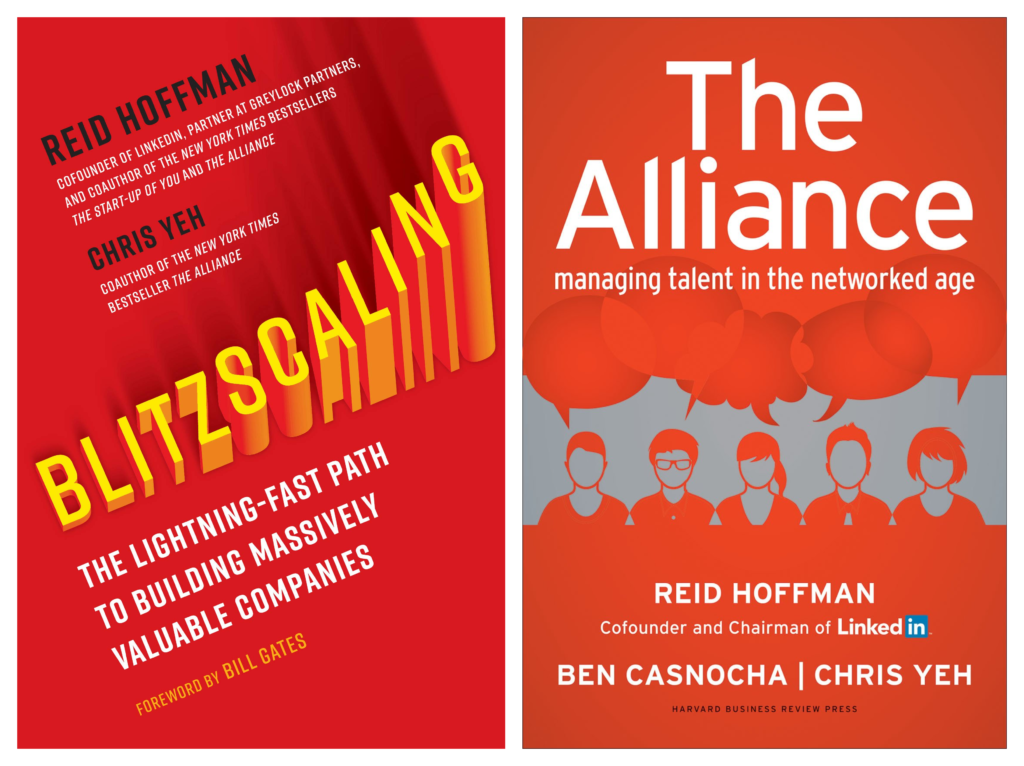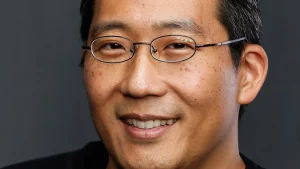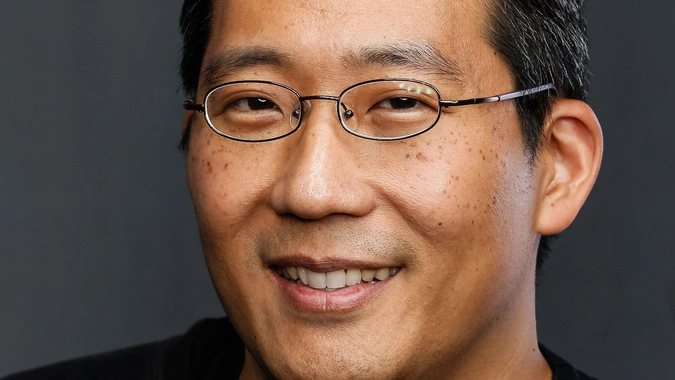“Help interesting people to do interesting things” – Fireside Chat with Chris Yeh, co-author of Blitzscaling: The Lightning-Fast Path to Building Massively Valuable Companies
“I help interesting people to do interesting things.”
Chris Yeh
Chris Yeh, along with Reid Hoffman, Linkedin co-founder, legendary investor, and host of the award-winning Masters of Scale podcast, is the author of the global best-selling book Blitzscaling: The Lightning-Fast Path to Building Massively Valuable Companies. With a foreword by Bill Gates, Blitzscaling reveals the secret to starting and scaling massively valuable companies. Chris is also the co-author, along with Reid Hoffman and Ben Casnocha, of the New York Times bestseller, The Alliance: Managing Talent in the Networked Age. Chris is not only a great author, but also the co-founder and General Partner of Wasabi Ventures and has founded, advised, or invested in over 100 high-tech startups since 1995.
Chris was featured in the Spring 2022 A. Richard Newton Lecture Series A Berkeley Changemaker™ Course hosted by the Sutardja Center of Entrepreneurship & Technology, where he gave his insight into multiple industries and contributed valuable tips he thinks every young investor should know about in their college years.

What did you do in college?
Chris graduated from Stanford majoring in product design and creative writing in 1994, and four years later went to Harvard Business School for his MBA. When Chris was at Stanford, he tried things that didn’t really make sense but seemed interesting. For example, he took an intro to acting class, made paper hairbands, and took a public speaking class. Some of these classes may not have given him the hard skills he needed for his career in later life, but nevertheless, the process was fun and the experience memorable for him.
“College is a place with the most opportunities to do things and with the least costs for doing it. To grasp the chance and try things that interest you.”
Chris also did peer counseling for a while, after first being counseled himself, and finding the experience very valuable. For him it was a crucial experience because he learned to listen to people non-judgmentally and help them clarify their thinking, which is a very important and useful skill that anyone, especially those wanting to become CEOs or founders. It is very hard to just listen and not inject our opinion into others’ matters or try to change people’s behavior.
Are there any tips about sleep?
“It is always easier to stay up late and sleep in than sleep early and get up early because of how our natural circadian rhythms work. Chris’s advice was:
- Get as much natural sunlight as possible when you get up, could be some exercising outside or just simply breathing the clean air.
- Don’t put pressure on yourself to fall asleep. If you cannot sleep, accept it and find something else to do.
- Listen to a boring podcast. For Chris, he listens to philosophy lectures, in German perhaps or with a narrator with a British accent.
Any start-up advise?
“Find something you are interested in doing, and try it. As you try it you will learn whether or not you can do it.”
Want to hear more about Chris’s opinion on LinkedIn, Clubhouse, Figma, and his wonderful dinner experience with Elon Musk? Check out the full video below.
Q&A:
- What kind of professional experience prepares you best for becoming a top executor?
- Be in sales, because you need to interact directly with customers and learn how to get money from people.
- The next most important thing is product experience. Learn how to make a great product and how to help an organization make great products; that’s gonna help you along the way.
- From Chris’s perspective, a marketing person that delivers sales results or product marketing is better than a marketer that focuses on branding only, since branding is just one tool that can only get you so far.
- What step of coming up with a business idea and turning it into a company would you say is the most difficult one?
- Finding something that’s important enough to people. Something people are dying to do.
- How much of your job did you have to learn on the spot?
- In my MBA, I learned more strategies and not necessarily the exact skills. I would say a lot of things you have to try yourself to actually learn it. I am learning not just from books but from sources I trusted online.
- What is the most interesting thing that has happened to you at work?
- After I launched Blitzscale, it was interesting and surprising to find people randomly talking about it and reading the book. The founder of Binance, CZ, is also reading the book and wants to talk to me about it.
- How do you prioritize every day?
- Organize my day using google calendar.
- Set the meetings to be 45 min long instead of one hour, which is more efficient and gives you a break to think in between.
- I recommend leaving larger blocks of your time, so you are not distracted by what’s coming next, and can instead focus on one thing and really do something.
- Any resources for young investors?
- I’m a big fan of asset allocation. Put the majority of your portfolio in equity, an international fund, fixed income, etc, and just don’t worry about it. Because the more people trade, the less well they do.
- “Take some portion of the money you can afford to lose and use it to invest and see what happens.”
This lecture was part of the A. Richard Newton Lecture Series: A Berkeley Changemaker™ course, where distinguished innovators are invited to share lessons from their own successes and failures. Students interested in taking the course can find more information here.
“I help interesting people to do interesting things.”
Chris Yeh
Chris Yeh, along with Reid Hoffman, Linkedin co-founder, legendary investor, and host of the award-winning Masters of Scale podcast, is the author of the global best-selling book Blitzscaling: The Lightning-Fast Path to Building Massively Valuable Companies. With a foreword by Bill Gates, Blitzscaling reveals the secret to starting and scaling massively valuable companies. Chris is also the co-author, along with Reid Hoffman and Ben Casnocha, of the New York Times bestseller, The Alliance: Managing Talent in the Networked Age. Chris is not only a great author, but also the co-founder and General Partner of Wasabi Ventures and has founded, advised, or invested in over 100 high-tech startups since 1995.
Chris was featured in the Spring 2022 A. Richard Newton Lecture Series A Berkeley Changemaker™ Course hosted by the Sutardja Center of Entrepreneurship & Technology, where he gave his insight into multiple industries and contributed valuable tips he thinks every young investor should know about in their college years.

What did you do in college?
Chris graduated from Stanford majoring in product design and creative writing in 1994, and four years later went to Harvard Business School for his MBA. When Chris was at Stanford, he tried things that didn’t really make sense but seemed interesting. For example, he took an intro to acting class, made paper hairbands, and took a public speaking class. Some of these classes may not have given him the hard skills he needed for his career in later life, but nevertheless, the process was fun and the experience memorable for him.
“College is a place with the most opportunities to do things and with the least costs for doing it. To grasp the chance and try things that interest you.”
Chris also did peer counseling for a while, after first being counseled himself, and finding the experience very valuable. For him it was a crucial experience because he learned to listen to people non-judgmentally and help them clarify their thinking, which is a very important and useful skill that anyone, especially those wanting to become CEOs or founders. It is very hard to just listen and not inject our opinion into others’ matters or try to change people’s behavior.
Are there any tips about sleep?
“It is always easier to stay up late and sleep in than sleep early and get up early because of how our natural circadian rhythms work. Chris’s advice was:
- Get as much natural sunlight as possible when you get up, could be some exercising outside or just simply breathing the clean air.
- Don’t put pressure on yourself to fall asleep. If you cannot sleep, accept it and find something else to do.
- Listen to a boring podcast. For Chris, he listens to philosophy lectures, in German perhaps or with a narrator with a British accent.
Any start-up advise?
“Find something you are interested in doing, and try it. As you try it you will learn whether or not you can do it.”
Want to hear more about Chris’s opinion on LinkedIn, Clubhouse, Figma, and his wonderful dinner experience with Elon Musk? Check out the full video below.
Q&A:
- What kind of professional experience prepares you best for becoming a top executor?
- Be in sales, because you need to interact directly with customers and learn how to get money from people.
- The next most important thing is product experience. Learn how to make a great product and how to help an organization make great products; that’s gonna help you along the way.
- From Chris’s perspective, a marketing person that delivers sales results or product marketing is better than a marketer that focuses on branding only, since branding is just one tool that can only get you so far.
- What step of coming up with a business idea and turning it into a company would you say is the most difficult one?
- Finding something that’s important enough to people. Something people are dying to do.
- How much of your job did you have to learn on the spot?
- In my MBA, I learned more strategies and not necessarily the exact skills. I would say a lot of things you have to try yourself to actually learn it. I am learning not just from books but from sources I trusted online.
- What is the most interesting thing that has happened to you at work?
- After I launched Blitzscale, it was interesting and surprising to find people randomly talking about it and reading the book. The founder of Binance, CZ, is also reading the book and wants to talk to me about it.
- How do you prioritize every day?
- Organize my day using google calendar.
- Set the meetings to be 45 min long instead of one hour, which is more efficient and gives you a break to think in between.
- I recommend leaving larger blocks of your time, so you are not distracted by what’s coming next, and can instead focus on one thing and really do something.
- Any resources for young investors?
- I’m a big fan of asset allocation. Put the majority of your portfolio in equity, an international fund, fixed income, etc, and just don’t worry about it. Because the more people trade, the less well they do.
- “Take some portion of the money you can afford to lose and use it to invest and see what happens.”
This lecture was part of the A. Richard Newton Lecture Series: A Berkeley Changemaker™ course, where distinguished innovators are invited to share lessons from their own successes and failures. Students interested in taking the course can find more information here.


